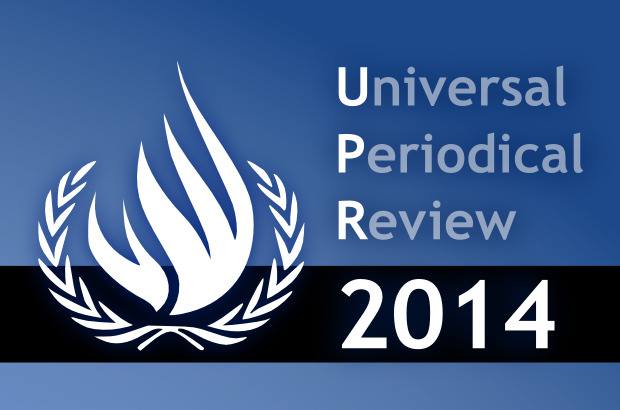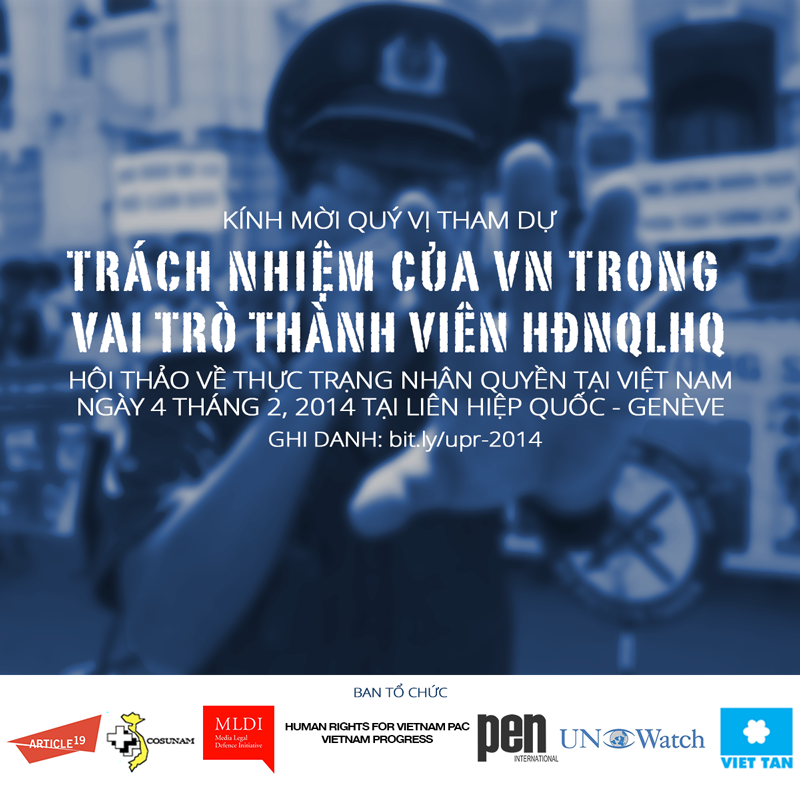“Injustice anywhere is a threat to justice everywhere.”
Why should we care about human rights for others?
I believe in improving others’ lives ultimately improves the quality of our own life on earth, by ensuring wealthy, peaceful and tolerant nations. I’ve seen through our everyday actions we thrive towards the respect of human rights and the values the represent because violations of human rights touch directly at the core values of humanity.
Awareness is not sufficient and we can not only rely on governments, leaders, corporate or nonprofit entities to get all the work done. We also need to take action ourselves.
That’s why I’m here today participating a Geneva conference entitled “With Membership Comes Responsibility: Ensuring Human Rights in Vietnam”. The conference, hosted by Vietnamese and international human rights organizations, was “to shine a spotlight on the most egregious human rights abuses in Vietnam today,” according to U.N. Watch, a Geneva-based human rights organization which monitors compliance with the principles of the global body’s charter.
Among the speakers are human rights defenders from Vietnam including: a human rights lawyer, the mother of an imprisoned activist, and a citizen journalist. They will speak on the challenges facing civil society and the growing crackdown in Vietnam.
Freedom of Expression, Assembly and Information
Did you know that the authorities in Vietnam systematically suppress freedom of expression, association and peaceful assembly?
Did you know that the government does not allow independent or privately owned media outlets to operate?
Did you know the government blocks access to politically sensitive websites?
Did you know they requires internet cafe owners to monitor and store information about users’ online activities?
It exerts strict control over radio and TV stations and written publications. Criminal penalties apply to those who disseminate materials deemed to oppose the government, threaten national security, reveal state secrets or promote “reactionary” ideas.
Did you know that authorities arbitrarily arrest those deemed dissidents and hold them incommunicado for long periods without access to legal counsel or family visits?
Did you know that the government has repeatedly prevented critics from making trips outside Vietnam, citing “national security reasons.”?
On May 10, 2013, Huynh Ngoc Chenh, the 2013 winner of Reporters without Borders Netizen of the Year Award, was prevented from leaving Saigon to fly to the United States.
Dynamic expansion
In response,activists have simply redoubled their efforts..
Vietnamese citizens are increasingly well-informed about the country’s problems. This has led to a dynamic expansion of critical but overwhelmingly constructive commentary, almost entirely predicated on non-violence, expressed via digital and other media, questioning official policies, exposing official corruption, protesting land-grabbing, practicing religious beliefs in unauthorized ways, or calling for democratic alternatives to one-party rule.
The government has responded with repression, including by expanding its legal assault on expression of opinion via the internet.
In response,activists have simply redoubled their efforts, while new voices and networks dedicated to the promotion of human rights and peaceful political change continue to emerge.
Bloggers and Facebook
People can get fines if they post “propaganda against til state” or “reactionary ideology” on social media channels like Facebook.
In September, Prime Minister Nguyen Tan Dung ordered the Ministry of Public Security to target blogs and websites not approved by the authorities, and to punish those who create them. People can get fines if they post “propaganda against til state” or “reactionary ideology” on social media channels like Facebook.
Torture, Cruel, Inhuman or Degrading Treatment and Death in Detention
Police brutality in all regions of Vietnam, including torture in detention and fatal beating, has been reported by official media and credible unofficial sources. In some cases, detainees died after beatings inflicted while they were in the custody of the police.
On May 29, 2013, Nguyen Van Duc died in the custody of the police of Vinh Long province. An autopsy reported that he died from “brain bleeding with cracks on his skull, crushed right brain, blood-clotted left brain, two broken ribs and broken sternum.”
In other instances, victims were killed in public areas when police used what appears to have been excessive force.
Right to a Fair Trial
Vietnamese courts lack the independence and impartiality required by international law. Where the party or government has an interest in the outcome, judges are instructed and trial outcomes are not determined by the facts or law. Trials are commonly marred by procedural and other irregularities committed in order to achieve the politically pre-determined outcome.
Vietnamese courts continue to lack the independence and impartiality required by international law.
Restrictions on observation of political trials by family members, human rights defenders, the media, diplomats and others often effectively mean the right to a public trial is breached. Attempts by bloggers and others deemed politically dangerous by the authorities to observe and report on political trials are regularly thwarted by police and other security forces, and by sometimes violent obstructive tactics conducted by vigilante or other elements operating on behalf of the authorities.
“Escalating repression is putting the Vietnamese government on a collision course with an increasingly politically aware and active population. Foreign governments should use all diplomatic means to pressure Vietnam to listen to the voices of the country’s people, who are demanding an end to old-style one-party rule.”
– Brad Adams, Asia director
Please follow the conference on twitter: #hoithaoupr #vietnamupr
Source: Human rights watch – World Report 2013




